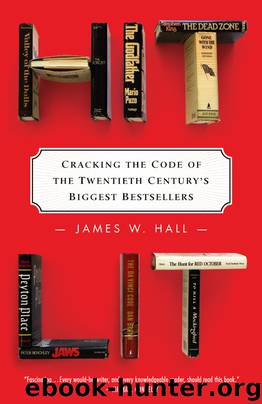Hit Lit by James W. Hall

Author:James W. Hall [Hall, James W.]
Language: eng
Format: epub, mobi
Tags: Reference, Literary Criticism, Business & Economics, (¯`'•.¸//(*_*)\\¸.•'´¯), Commerce, Books & Reading
ISBN: 9780812970951
Google: MYeV_5ikZRoC
Amazon: 0812970950
Publisher: Random House Trade Paperbacks
Published: 2012-04-10T04:00:00+00:00
SECULARISM
It should come as no surprise that of the dozen books on my list, almost all of them share one ingredient, a strong religious content.
What is surprising, however, is how heretical they are in interpreting what might be considered mainstream religious perspectives. For most of the bestseller authors under review here, skepticism is the shared religious stance. To one degree or another, each of the novels portrays characters afflicted with spiritual doubt. It would seem that the bestselling authors of all time are a collection of freethinkers and agnostics who share a tendency to ridicule religious hypocrisy and aggressively challenge standard orthodoxy.
That’s not to say that the most popular books of all time are hostile to faith and organized religion. Rather, they seem to focus on the worldly consequences of religious practice rather than the spiritual aspects. In a word, the morality of bestsellers is rooted in a vision of culture that we know as secular.
Part of this secularism derives from the history of the novel form itself. As Ian Watt described in The Rise of the Novel: “The relative impotence of religion in Defoe’s novels, then, suggests not insincerity but the profound secularization of his outlook, a secularization which was a marked feature of his age—the word itself in its modern sense dates from the first decades of the eighteenth century.”
In addition to the tendency inherent in the earliest English novels to take a stand against orthodoxy, there is the particular American inclination to raise doubts about religious doctrine. Our forefathers, for all their religiosity, were the first great doubters. Take, for example, Thomas Jefferson in a letter to John Adams concerning the Bible’s literary value:
The whole history of these books [the Gospels] is so defective and doubtful that it seems vain to attempt minute enquiry into it: and such tricks have been played with their text, and with the texts of other books relating to them, that we have a right, from that cause, to entertain much doubt what parts of them are genuine. In the New Testament there is internal evidence that parts of it have proceeded from an extraordinary man; and that other parts are of the fabric of very inferior minds. It is as easy to separate those parts, as to pick out diamonds from dunghills.
Download
This site does not store any files on its server. We only index and link to content provided by other sites. Please contact the content providers to delete copyright contents if any and email us, we'll remove relevant links or contents immediately.
| Booksellers & Bookselling | General |
| History of Books |
4 3 2 1: A Novel by Paul Auster(11101)
The handmaid's tale by Margaret Atwood(6899)
Giovanni's Room by James Baldwin(5937)
Big Magic: Creative Living Beyond Fear by Elizabeth Gilbert(4763)
Asking the Right Questions: A Guide to Critical Thinking by M. Neil Browne & Stuart M. Keeley(4626)
On Writing A Memoir of the Craft by Stephen King(4250)
Ego Is the Enemy by Ryan Holiday(4024)
Ken Follett - World without end by Ken Follett(3992)
The Body: A Guide for Occupants by Bill Bryson(3863)
Bluets by Maggie Nelson(3744)
Adulting by Kelly Williams Brown(3704)
Guilty Pleasures by Laurell K Hamilton(3618)
Eat That Frog! by Brian Tracy(3550)
White Noise - A Novel by Don DeLillo(3454)
The Poetry of Pablo Neruda by Pablo Neruda(3389)
Alive: The Story of the Andes Survivors by Piers Paul Read(3335)
The Book of Joy by Dalai Lama(3258)
The Bookshop by Penelope Fitzgerald(3249)
Fingerprints of the Gods by Graham Hancock(3240)
